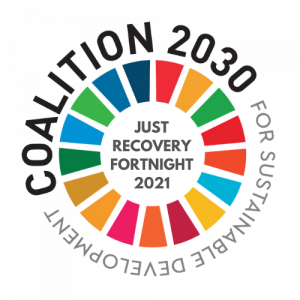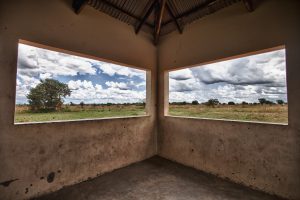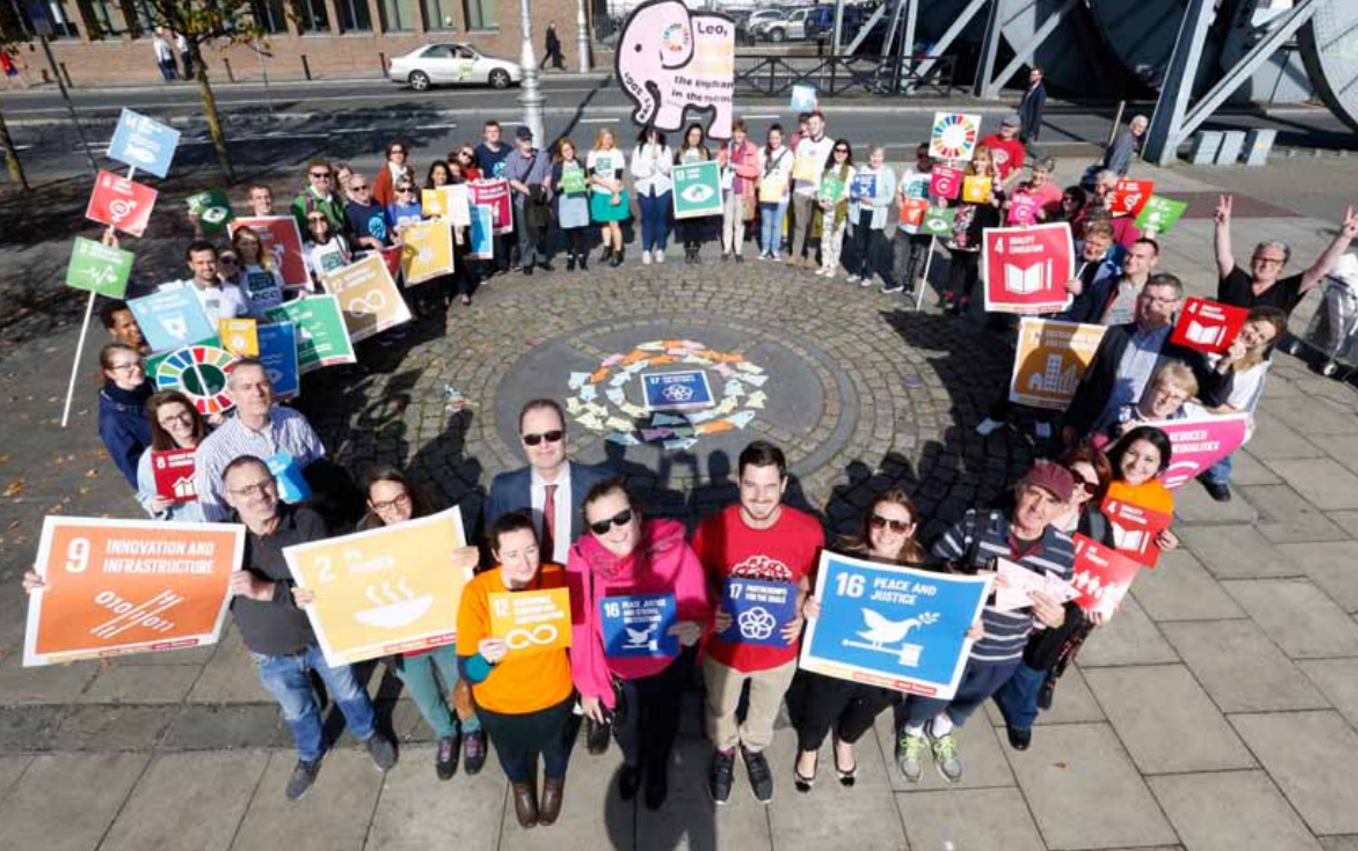- Members of Coalition 2030 Ireland campaigning on the Sustainable Development Goals
developmenteducation.ie’s Gina Dorso and Aoife Mc Donald joined a major civil society event that explored a wide range of ideas for a more ‘just recovery’ from COVID-19, based on the lens of the Sustainable Development Goals agenda. Here are their 8 takeaways from the event.
Last week, Coalition 2030 hosted the A Just Recovery from Covid-19: Using the Sustainable Development Goals to Guide Ireland’s Development conference.

This conference focused on addressing the inequalities that Covid has exposed, so that as we are planning our recovery from the COVID-19 pandemic, we are making sure it is a just recovery. This event built on the six principles for a fair and sustainable recovery backed by almost 60 Irish civil society partners in a joint statement last year, the 2020 Shared Vision for a Just Recovery.
Keynote speakers included the Executive Director of the WHO Health Emergencies Programme, Dr Mike Ryan, Deputy Director of the International Trade Union Confederation, Paola Simonetti, and the Executive Director of War on Want, Asad Rehman. Four themes stood out throughout the discussion: equity, access, dignity and solidarity.
Here, we’ve compiled our key takeaways from this exciting event.
On Equity
“The reality is, for every $1 that flows in aid $24 flows in the opposite direction. It literally is that the south is developing the global north” – Asad Rehman, War on Want
and
“So really [the Global North & the Global South] are experiencing divergent recoveries, particularly exacerbated by the absence of strong international cooperation to beat the pandemic everywhere.” -Paola Simonetti, International Trade Union
1. COVID-19 has exposed global inequalities that have been around for a long time. If we are going to recover from this global pandemic, and others to come, and reach our Sustainable Development Goals, we need to do it globally. We are all equal, we cannot have a two-tier pandemic or climate apartheid.
2. We have the power to decide what kind of recovery we want, and we all have something at stake. Inclusive, equitable, and participatory decision-making needs to be a key feature in our progression.
On Access
“We need universal access to healthcare. Healthcare is not a commodity. It’s not something to be traded. Healthcare is about the preservation of health – it’s one of our true and only assets when we’re born, most of us, thankfully, with a capacity to be healthy and to be happy. And our lives either enhance or take away from that.” – Dr. Michael Ryan, WHO
3. A just recovery needs to start with universal access to vaccines. We have the “money, means and science” to end the pandemic, but not the willingness to share vaccines, and vaccine intelligence. We know that the longer we wait to share these vaccines, the further the virus will mutate and the longer it will take the world to recover.
4. Healthcare should not be seen as a commodity. Epidemics and pandemics will be a feature of a “biome out of balance”, and the unprotected will suffer a vastly greater expense. We need to prioritize global public health.
On Dignity
“I think we forget this word, we forget the right to dignity, the dignity of work, the dignity of home, the dignity of access to health care without risking your financial future.” – Dr. Michael Ryan, WHO
5. We don’t just want to rebuild or recover; we want to do so with dignity. People should have the right to work, right to a safe home, right to healthcare, right to food, WITH dignity.
6. The very notion of progress needs to be redefined, because at the moment, it does not prioritize dignity. Public services, living wages, social protection and worker’s rights are fundamental to a just recovery with dignity.
On Solidarity
“We’re losing so many people, because the health and well being of our population has not been strong enough […] because we haven’t invested in that resilience, we haven’t invested in solidarity. We haven’t invested in caring, giving a damn about each other, we’ve isolated our societies into nice units of production, the individual on a treadmill, producing for fear of losing. And that is the society we’ve created and not one that does well in a pandemic, not one that can come together quickly to find solutions.” – Dr. Michael Ryan, WHO
7. We need to strengthen connections both locally, here in Ireland, and globally to ensure a just transition. This means actively pursuing solidarity across borders and lobbying, and pressuring our elected officials about the need to deliver faster climate action, and restoration of nature.
8. We are not only facing a global health pandemic, but as Dr. Ryan put it, a “pandemic of self-interest”, we need global solidarity in the face of both the COVID-19 pandemic and climate change.
These are not Sustainable Development Goals anymore. They are, as Dr. Mike Ryan put it, Sustainable SURVIVAL Goals. There is a need to invest in public health and well-being, as epidemics and pandemics will be a feature of the future due to the effects of climate change.
Here in Ireland, this means investing in public health, marginalised communities and proper social protection. It means consideration for the people of the Global South, and coverage of their plight across our national news media to continue to build solidarity across borders. For activists, it means pressuring the Irish government to take action on the climate, to make climate-friendly living affordable, and to protect our most vulnerable. It is important to recognise the value of civil disobedience when elected officials fail to protect the population.
Lastly, for educators, it is necessary to relay to young people how inequality both at home and at a global level impacts their future. As Dr. Ryan summarised:
“How many people do you know in your life experience, who have to live without that basic dignity? I think the young people need to consider that. Do you want to inherit a world in which basic human dignity is not guaranteed?”
While these are our 8 key takeaways, there are many more!
- Keep an eye on conference outputs and materials from the Just Recovery Covid-19 conference pages over at Coalition 2030
- Check out developmenteducation.ie’s Covid-19 dashboard for tools, resources, ideas and stories following the global pandemic.
Explore more on developmenteducation.ie

Deniers, Delayers and Regulators, Oh My! Who’s involved in greenwashing?
Who is responsible and who is to blame for practices that can only amount to being called greenwashing? A teachers’ guide by Rachel Elizabeth Kendrick

A teachers’ guide to Greenwashing
A guidebook to support teachers and students in learning about greenwashing as a barrier to sustainable development.

Youth Rising: India’s Vote, India’s Future
Trishla Haryani looks at the 2024 Indian election and the critical role of young people’s vote in shaping it’s political landscape.

Under the Gavel: Are International Courts and Bodies Working?
Daniel McWilliams looks at how the ICC and the ICJ function and any challenges and criticisms faced by them and other international bodies.

30 smeach chárta ar líne: Bia, cothú agus an domhan
‘Foods’ stands for diversity, nutrition, affordability, and safety. A greater diversity of nutritious foods should be available in our fields, in our markets, and on our tables, for the benefit of all.

Extra-curricular Opportunities at Post-Primary Level
Fancy organising a workshop? Many NGOs have members of staff who do outreach and education visits to schools as part of their education programmes.

